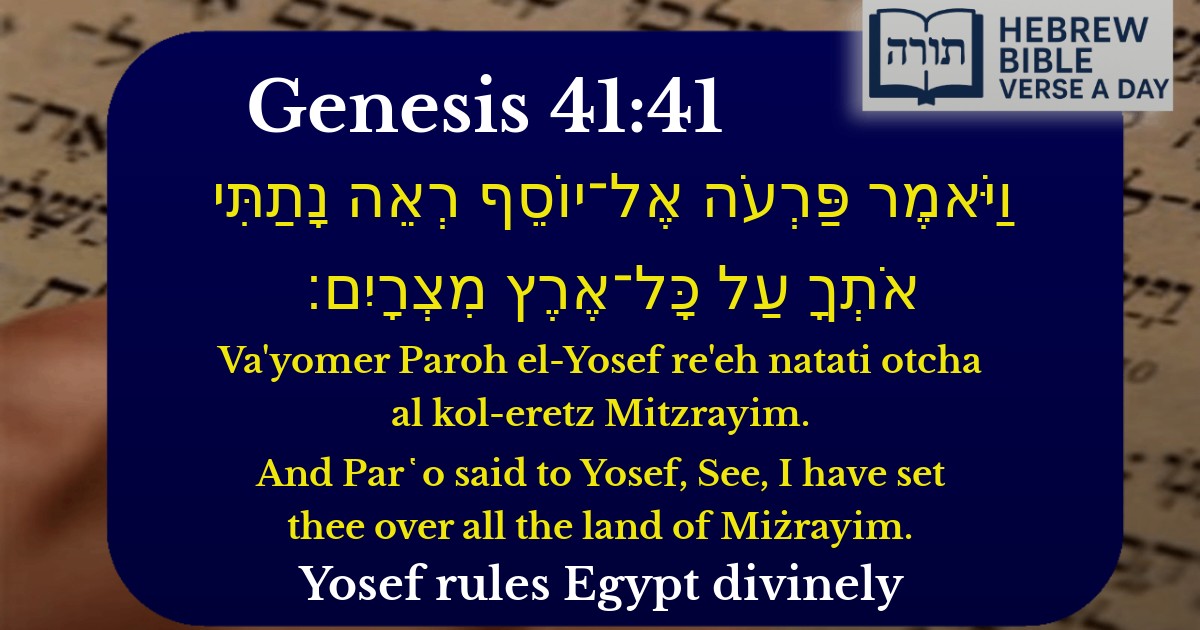Frequently Asked Questions
Q: What does it mean that Pharaoh set Yosef over all the land of Egypt?
A: This means Pharaoh appointed Yosef as the second-in-command over Egypt, giving him complete authority to manage the country's affairs, especially in preparation for the upcoming years of famine (Rashi on Genesis 41:41). This was an extraordinary elevation for a foreigner and former prisoner.
Q: Why did Pharaoh give Yosef such a high position?
A: Pharaoh recognized Yosef's wisdom and divine inspiration after Yosef correctly interpreted his dreams and proposed a practical plan to save Egypt from famine (Rambam, Hilchos Yesodei HaTorah 7:1). This demonstrated that Yosef was guided by Hashem, making him the most qualified leader for the task.
Q: What can we learn from Yosef's rise to power in Egypt?
A: We learn that Hashem rewards righteousness and fulfills His plans in unexpected ways. Despite Yosef's hardships (being sold into slavery and imprisoned), his faithfulness to Torah values led to his elevation (Midrash Bereishis Rabbah 89:2). This teaches us to trust in Hashem's plan even during difficult times.
Q: How does Yosef's leadership in Egypt apply to us today?
A: Yosef used his position to help others (eventually saving his family and the region from famine). This teaches that leadership is a responsibility to serve with integrity and kindness (Talmud, Ta'anis 11a). Jews in positions of influence today should follow his example of ethical leadership.
Q: Was Yosef's appointment over Egypt a fulfillment of his dreams?
A: Yes, this was the beginning of the fulfillment of Yosef's earlier dreams (Genesis 37:5-11), where his brothers bowed to him. The Midrash explains that these events were all part of Hashem's plan to bring Bnei Yisrael to Egypt (Midrash Tanchuma, Vayeshev 4).


Pharaoh's Appointment of Yosef
The verse (Bereshit 41:41) describes Pharaoh's declaration appointing Yosef as ruler over all of Egypt. This moment marks the fulfillment of Yosef's earlier dreams (Bereshit 37:5-11), where his brothers and parents would bow to him. Rashi notes that Pharaoh's words "רְאֵה נָתַתִּי אֹתְךָ" ("See, I have set you") emphasize the immediacy and certainty of Yosef's elevation—Pharaoh was not merely promising future authority but enacting it at that moment.
Yosef's Authority Over Egypt
The phrase "עַל כָּל־אֶרֶץ מִצְרָיִם" ("over all the land of Egypt") signifies complete dominion. The Ramban explains that Pharaoh granted Yosef absolute power, second only to the throne itself. This is reinforced by the subsequent verses (41:42-44), where Pharaoh gives Yosef his signet ring, fine garments, and a royal chariot—symbols of delegated kingship.
Divine Providence in Yosef's Rise
The Midrash (Bereshit Rabbah 90:3) highlights that Yosef's ascent was orchestrated by Hashem to fulfill a greater plan—preserving Bnei Yisrael during famine and setting the stage for their eventual redemption. The Sforno adds that Yosef's leadership was Divinely guided to ensure just governance, as seen in his later policies (Bereshit 47:13-26).